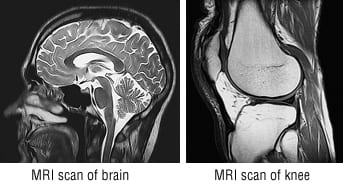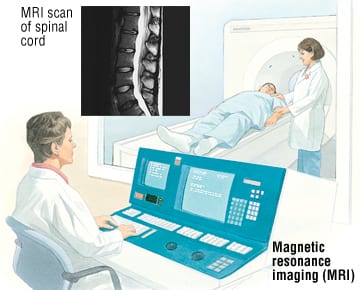Patient Basics: Magnetic Resonance Imaging (MRI)
Originally published by Harvard Health.
What Is It?
Magnetic resonance imaging (MRI) is a diagnostic technique that uses a magnetic field to produce pictures of structures inside the body.
During an MRI, your body is in a very strong magnetic field. The MRI machine also uses pulses of radio waves. The machine creates an image based on the way hydrogen atoms in your body react to the magnetic field and the radio waves. MRI signals can give an image of a single slice of any part of the body, much like a slice of bread in a loaf. Usually, images are created of several “slices” of an organ or part of the body. The MRI’s computer also can combine these slices into three-dimensional (3-D) images.
Because water molecules are especially sensitive to the forces used in this technique, MRI scans are very good at showing differences in water content between different body tissues. This is particularly important in detecting tumors and in checking for problems in the body’s soft tissues, such as the brain, spinal cord, heart and eye.
What It’s Used For
MRI scans have many uses. They can:
- Help to determine if someone has had a stroke
- Support a diagnosis of multiple sclerosis
- Identify problems of the brain and spinal cord that may not be seen on a computed tomography (CT) scan.
- Detect cancerous tumors in many organs, including the brain, spinal cord, lung, liver, bone, prostate and uterus
- Help to determine whether a lump in a woman’s breast is cancer or noncancerous fibrocystic disease
- Pinpoint cancers in women who have very dense breast tissue or breast implants.
Preparation
Because MRI uses a strong magnetic field that can move metal objects, you cannot have an MRI scan if you have a metallic implant such as a pacemaker or implanted pump, or if you have an artificial joint, implanted metal plates or screws, or metal surgical clips. You also may need to avoid MRI scans if you have a hearing aid, metal monitoring device or certain types of tattoos. Always check with your doctor before the procedure.
Most MRI scanners require you to lie inside a narrow cylinder. This can make some people feel anxious and claustrophobic. If you tend to feel anxious in tight places, ask your doctor for medication to help you relax during the procedure. A new type of MRI scanner, called an open MRI, is more comfortable for some people because it is open on all sides.
MRI scanners also make loud knocking sounds. Usually the technician will offer ear plugs or earphones so you can listen to listen to music or the radio during the test. You also will be given a button that you can press if you are feeling claustrophobic and want to stop the scan.
How It’s Done
MRI is a painless technique that usually takes about 20 minutes. MRI usually is done as an outpatient test in a special scanning area of a hospital or in a scanning facility. You will be asked to remove all metal jewelry and to lie on a scanning table. If a cylindrical scanner is being used, the table will slide into the narrow opening into the MRI cylinder. In an open MRI, the table will slide so that the part of your body being scanned is surrounded by the scanning element, or the machine will move over you as you lie on the table. You will need to lie very still during the procedure, and you will periodically hear loud knocking noises as the scanner works. The technicians operating the machine will be in another room. However, they will be able to talk to you through speakers in the machine or through earphones.
Follow-Up
If your doctor gave you a sedative or tranquilizer to make you more comfortable during scanning, you may be drowsy after your MRI procedure, and you may not be able to drive safely. Have a friend or family member take you home.
Your MRI scan will be read by a specialist who will tell your doctor the results. Ask MRI facility personnel about when you should call your doctor for the official report.
Risks
MRI has no risks or side effects in people without implanted metallic or electrical devices.
When To Call a Professional
Because MRI has few known side effects, you probably will not need to call your doctor after the procedure, except to get your scan results.
Additional Info
National Institutes of Health (NIH)
9000 Rockville Pike
Bethesda, MD 20892
Phone: 301-496-4000
TTY: 301-402-9612
http://www.nih.gov/






![The ABCD2 score: Risk of stroke after Transient Ischemic Attack (TIA) [Classics Series]](https://www.2minutemedicine.com/wp-content/uploads/2013/05/web-cover-classics-with-logo-medicine-BW-small-jpg-350x250.jpg)